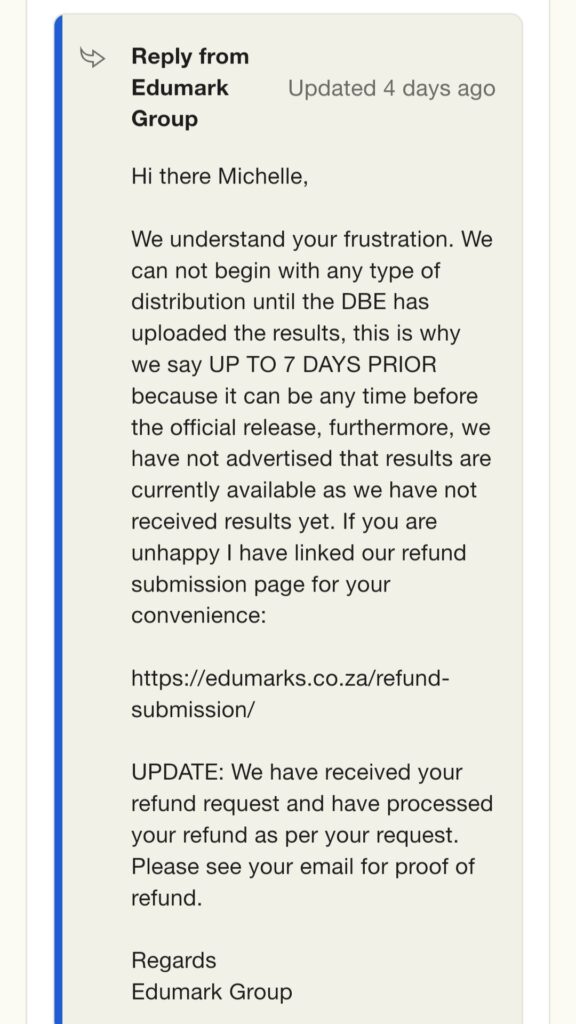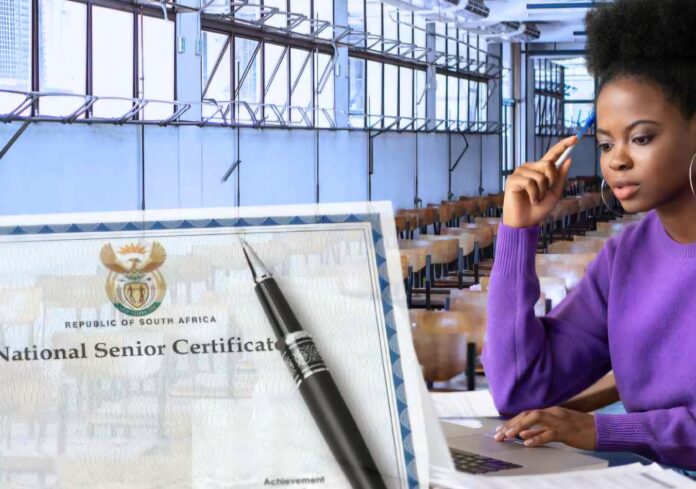Johannesburg — concerns are mounting following claims that South Africa’s 2024 National Senior Certificate (NSC) matric results have been compromised.
Allegations suggest that a Johannesburg-based private company has been selling these results for a fee before their official release by the Department of Basic Education (DBE).
A company named Edumarks has advertised its ability to provide matriculants with their full results ahead of the DBE’s official release date, scheduled for Tuesday, January 14. (see key dates for 2024matric results here). For a one-time fee of R99.90, the company promises students access to their full results online, requiring only their 13-digit examination number.
In a social media post, the company stated:
“Nobody likes waiting, especially for matric results. At Edumarks, we make it easier to check your full matric results online. For a small one-time fee, you can access your results online with Edumarks, saving you from the anxiety of waiting.”
The company’s website further clarifies that the service is exclusively available to NSC learners, excluding Independent Examinations Board (IEB) students.
Public Reaction and Matriculants’ Feedback
The revelations have sparked outrage among South Africans, with many questioning how Edumarks gained access to such sensitive information. Some matriculants who have used Edumarks’ services have shared their experiences on the consumer review platform, Trustpilot, providing mixed feedback:
Positive Review: One user praised the company for delivering as promised, stating they received their results efficiently and on time.
Negative Review: however, another user, Michelle, expressed dissatisfaction, claiming she paid the fee but never received her results. In response, Edumarks stated, as seen in the screenshot below, they could not distribute results until the DBE officially released them, adding to the confusion surrounding the legitimacy of their services.

These conflicting reports have further fueled concerns over whether the company’s actions represent a genuine breach of data security or merely an exploitation of public anxiety. One such a complaint is from prominent education activist, Hendrick Makaneta, who expressed concerns about a potential breach of data security, suggesting that this incident may involve unethical conduct and collusion between DBE staff and private entities.
Makaneta stated:
“If true, this suggests a potential breach of data security and a violation of learners’ right to privacy. It also raises suspicions of unethical conduct and possible collusion between individuals within the DBE and private entities for financial gain.“
Calls for an internal investigation have intensified, with anti-crime activist Yusuf Abramjee putting his weight behind Makaneta’s plea for DBE and the Special Investigating Unit (SIU) to step in to protect matric examination process’s credibility.
“This matter must be resolved swiftly to protect the credibility of the matric examination process and to reassure South Africans that the education system remains secure and free from unethical practices,” Makaneta further charged.
The news comes just days after the Pretoria High made a landmark ruling over the Information Regulator’s attempt to stop the publication of the 2024 matric results in South Africa’s newspapers was thrown out by the Gauteng High Court. In the ruling judge Ronal Tolmay said that the matter was not urgent and struck it from the roll with costs.
Awaiting DBE’s response
NOWinSA has also learnt some matriculants have already received a full report from Edumarks, including the percentage obtained on each subject they wrote. The DBE has yet to issue an official response addressing the allegations or clarifying the extent of the data breach.
As for the question of leaked matric results, for now it appears Edumarks may have failed to uphold the DBE’s confidentiality agreement, which is also given to media outlets, not to publicly release the matric results prior to the embargo being lifted, which in thus case is Monday (January 14) night.
And for now, with these allegations casting a shadow over the matric results, the credibility of the examination process now depends on the DBE’s ability to address the claims and restore public trust.

